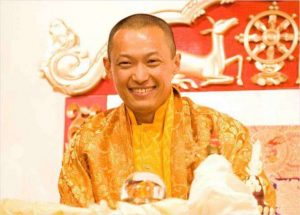
Note: Due to potential political risks for some of the participants of this program, personal details of the students have been withheld.
The International Network of Engaged Buddhists’ (INEB) annual School of English for Engaged Social Service (SENS)—a three-month transformative learning program to nurture young adults and mentor them as community leaders and agents of compassionate social change—held a graduation ceremony for its 2023 cohort on 8 April, in the lush grounds of INEB’s Wongsanit Ashram and training campus just outside of Bangkok.
In his opening address for the occasion, the academic director of the SENS program, Ted Mayer, praised the hard work, dedication, and sincerity of the 16 students who attended this year’s program, hailing from Cambodia, China, India, Myanmar, and Vietnam—and especially those for whom attendance was undertaken at considerable personal risk: “This is your program and we want to hear your voices!” Mayer emphasized.
“First of all I want to thank Jungto Society and Venerable Pomnyun Sunim for making the effort to be here today from Korea. We really appreciate your presence,” Mayer observed. “Jungto Society provided one full scholarship this year, which enabled us to bring a student from Myanmar. This gift will never be forgotten. Jungto society also donated 25 copies of this recent book by Ven. Pomnyun Sunim, Life, Here and Now. Thank you so much!
“Thank you also to our friends from the Regional English-Language Office (RELO) of the US embassy in Bangkok for providing two full scholarships. I want you all to know that RELO has been one of the kindest, most considerate, and most consistent supporters of our program. I really appreciate you so much.
“I also want to give my thanks and respect to a small group of students who faced incredible difficulties just to be here—we should not live in a world where travel from one country to another is a dangerous exercise. That is not the way we want this world to be.
“Thank you also to so many of the Vietnamese students who contributed to your tuition out of their hard-earned savings. This really helped a lot. I’d further like to thank Somboon Chungprampree, the executive secretary of INEB, for also providing one full scholarship, and the many other people, some of whom are here today, who contributed generously. This is why we could bring 16 students here this year.”
Hosted by the INEB Institute, a non-profit institute of higher education, INEB’s annual SENS program integrates English-language training with self-awareness and interpersonal support, tied in with an understanding of social and ecological challenges, in order to train young adults in leadership. With an emphasis on sustainability—for the planet, for society, and for the human spirit—the program seeks to engender among its students the diverse skills and personal qualities needed to bring about personal, social, and ecological resilience. This year’s 12-week course of intensive instruction, with climate justice as a key theme, commenced in Thailand in January.
Mayer’s address then focused on the 16 young leaders gathered for their graduation: “For the students, I want to thank you for daring to share yourselves. For sharing your beauty and your struggles. For sharing your confidence and your embarrassment. And thank you for trying—that’s so important and it takes courage. Thank you for being honest. Thank you for your wholehearted willingness to help each other, and me, and other people here. It was all of us together who made this a safe space. Thank you for your part in that.”
Concluding his opening words, Mayer shared some final thoughts that resonated deeply with everyone present: “I want to add that this SENS course, I think, has been the most successful ever. This is our seventh in-person course, and our eighth course if you count last year’s online SENS program for Myanmar activists. I feel that this has been the most successful by far in terms of what we have done together and in terms of what you were able to see during your field trips and workshops, and in terms of how you were able to grow.
“Part of [why all of this is so remarkable and so worthwhile] is because our neighboring countries are in the midst of horrible violence comparable to the situation in Ukraine, and yet many people are unaware. . . . And I’m sorry to say that it’s even to the point that we heard news of the loss of loved ones during the course. Why does anyone need to suffer that? It should not be happening, but it is happening.
“So what can we do to face these realities yet still see the beauty that’s there and the things that we can do . . . ? I believe that the worldwide economic and infrastructural system is crumbling right now. We know that the warming of the Earth is creating an untenable situation. This is also very real. . . .
“I feel strongly when look at the students that I’m not saying goodbye today. I know that physically, you’re all leaving, but we’ve already begun working together, and that is not going to end here. I feel that very strongly. It’s not only coming from me; I’m not even pushing it. I feel it from the students, who have told me that they’re interested in carrying on our work.
“This work involves paying attention to what really needs to be done. World leaders are not doing that, I’m sorry to say. They’re paying attention to power, to gathering resources, to making their projects work, but oftentimes they’re not paying attention to what needs to be done—but all of you are!”
One by one, the 16 remarkable students of INEB’s SENS 2023 Transformative Learning Program took to the podium to introduce themselves, to share about their challenges and personal growth, and about their aspirations for their lives after SENS.

As the occasion drew to a close, the guest of honor, the revered Korean Seon (Zen) master and social activist, and patron of INEB, Ven. Pomnyun Sunim, was called to the podium. The venerable took the opportunity to congratulate the students on their courage and dedication in completing the SENS course, and offered some thoughts on the occasion for the students to take with them as they returned home:
“A great master from a long time ago once said: if I am aware of my mind, I am the Buddha. If I’m not aware of my mind, I am just a sentient being. . . . The state of mind without suffering is called the Buddha. If your state of mind is one of suffering, your are just a sentient being. So we have to maintain our mind as one without suffering. . . .
“The Buddha’s teaching is very simple; there are three main characteristics: First, recognize the truth as the truth. Second, the Buddha’s teaching is simple—knowing the truth as the truth is the easiest way, if it’s is difficult, it’s not the Buddha’s teaching. Third, the Buddha’s teaching can be applied to everyday life; there’s no Buddha’s teaching without everyday life.
“But the way the Buddha’s teaching is shared has changed a lot over the years. It has become more difficult, it has become more vague, and it has become something outside of everyday life. They call this the Buddhadharma, but it’s not really—it’s just a religion called Buddhism. I hope you don’t become devotees of this kind of Buddhism, but instead become real Buddhist practitioners and follow the teaching of the Buddha.
“If your mind is suffering, cure your mind. This is Buddhist practice. If society is ill, you have to cure society: if there’s discrimination, or war, or poverty, these are the sicknesses of society and we have to cure them. If you are true followers of the Buddha, of course, you have to work to cure society. . . . If you look for the reasons for this sickness, you’ll see it comes from people’s ignorance, from those who cannot see the truth as the truth.”

The INEB Institute was established by INEB with the intention of creating a model institute of higher learning offering study programs that integrate progressive practices and learning strategies with a focus on peace and reconciliation, environmental healing, alternative education, sustainable economics, and the capacity for spiritual growth and leadership. Embodying the principals of socially engaged Buddhism, the institute’s primary purpose is to help young people rediscover their fundamental interdependent nature while developing the skills to become agents of genuine social change.
“Our vision is that positive and lasting social change must be grounded in a transformation of the way each individual views her or his connection to our world and all its inhabitants. We welcome students from any country, regardless of age, occupation, and social or religious status,” the INEB Institute said.
The International Network of Engaged Buddhists (INEB) is a global network of individuals and organizations who are committed to promoting and working toward social justice, environmental sustainability, and world peace.
INEB was formed in 1989 by Prof. Sulak Sivaraksa and a group of Buddhist leaders and scholars seeking to apply the Buddhist teachings and principles to contemporary social and political issues. Through its global network, INEB works to promote understanding, cooperation, and connection among inter-Buddhist and inter-religious groups, and to actively address urgent global issues such as human rights, conflict resolution, and environmental crises.
Headquartered in Bangkok, INEB has established a wide range of social projects and outreach programs aimed at overcoming suffering and empowering vulnerable communities through the practice of the Dharma and social engagement, such as education and training programs, community development projects, advocacy and lobbying efforts, and interfaith dialogue.
The network also advocates the importance of environmental sustainability and the responsible use of natural resources, and has promoted sustainable development practices in various communities.
INEB emphasizes the importance of developing an ethical, Dharma-based approach to its work, and encourages its members to work collaboratively and respectfully with individuals and organizations upon a foundation of shared values and aspirations.
See more
International Network of Engaged Buddhists
School of English for Engaged Social Service (SENS)
INEB Institute
INEB – International Network of Engaged Buddhists (Facebook)
The INEB Institute (Facebook)
Related news reports from BDG
INEB Celebrates the 90th Birthday of Exemplar of Engaged Buddhism Sulak Sivaraksa
Engaged Buddhism: INEB’s SENS 2023 Transformative Learning Program to Commence in January
Engaged Buddhism: INEB to Join World Day of Prayer and Action for Children 2022 Symposium in Rome
INEB Institute Plans SENS 2021 Mentoring Program for Young Leaders amid Pandemic Caution
INEB’s SENS 2020 Transformative Learning Program to Launch in January
International Network of Engaged Buddhists Announces SENS 2019 Transformative Learning Program















